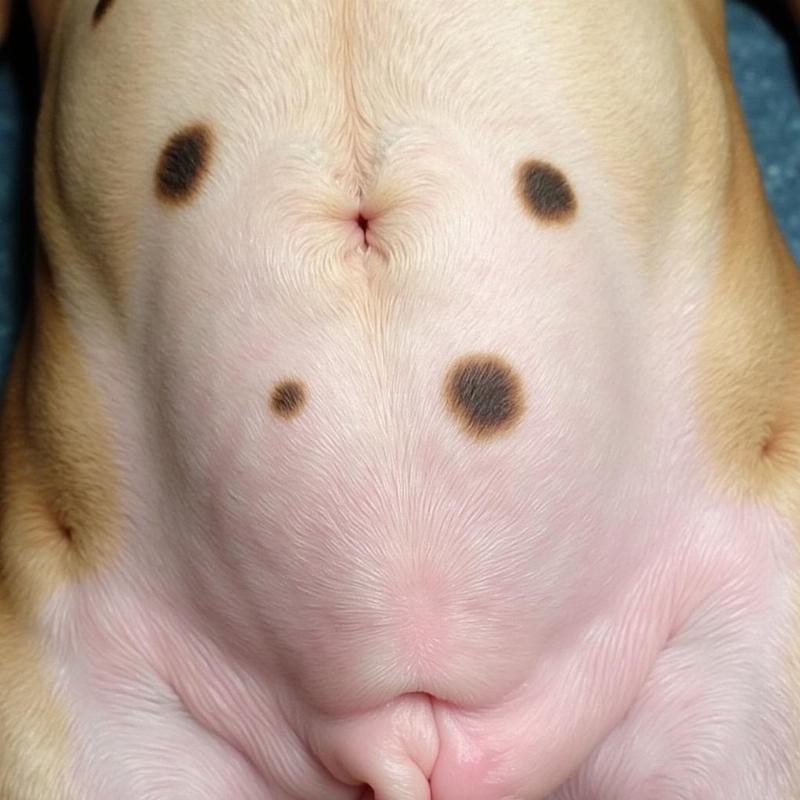Dog age spots, also known as lentigines, are a common occurrence in older dogs, often appearing on their belly and other areas with thinner fur. While they can sometimes cause concern for owners, these spots are typically harmless and simply a sign of aging, much like age spots in humans. If you’ve noticed these dark patches on your dog’s belly, this article will provide you with valuable information to understand their causes, potential concerns, and how to differentiate them from more serious skin conditions.
What Causes Dog Age Spots on Belly?
Dog age spots are caused by an increase in melanin production, the pigment that gives skin its color. As dogs age, the cells responsible for producing melanin, called melanocytes, can become more active in certain areas, leading to the formation of these flat, dark spots. Several factors can contribute to this increased melanin production, including genetics, sun exposure, and hormonal changes. Certain breeds, like Boxers, Doberman Pinschers, and Rottweilers, are more prone to developing age spots.
 Close-up of dog age spots on belly
Close-up of dog age spots on belly
Are Dog Age Spots on Belly Harmful?
In most cases, dog age spots are benign and not a cause for concern. They are typically flat, smooth, and don’t cause any discomfort to the dog. However, it’s crucial to differentiate them from other skin conditions that might require veterinary attention.
Differentiating Age Spots from Other Skin Conditions
While age spots are usually harmless, it’s important to monitor them for any changes. If you notice any of the following, consult your veterinarian:
- Raised or bumpy texture: Age spots are typically flat. Any change in texture could indicate a different skin condition, such as a wart or tumor.
- Rapid growth: While age spots can gradually increase in size, rapid growth is a warning sign.
- Irregular shape or color: Benign age spots are usually uniform in color and shape. Irregularities can be a sign of melanoma or other skin cancers.
- Itching, redness, or bleeding: These symptoms are not associated with age spots and could indicate an infection or allergic reaction.
When to See a Vet about Dog Age Spots on Belly
If you are unsure whether a spot on your dog’s belly is a simple age spot or something more serious, it’s always best to err on the side of caution and consult your veterinarian. They can perform a physical exam and, if necessary, a skin biopsy to determine the nature of the spot.
How to Care for a Dog with Age Spots
There’s no specific treatment for age spots, as they are a natural part of the aging process. However, maintaining your dog’s overall health with a balanced diet, regular exercise, and proper grooming can help keep their skin and coat healthy.
Conclusion
Dog age spots on the belly are generally a harmless sign of aging. While monitoring them for any changes is essential, they rarely pose a health risk. By understanding the characteristics of age spots and differentiating them from other skin conditions, you can ensure your furry friend receives the appropriate care and attention.
FAQ
- Are dog age spots painful? No, age spots themselves are not painful.
- Can age spots be removed? While removal is possible, it’s typically not necessary unless they are causing discomfort or are suspected to be cancerous.
- Do age spots only appear on the belly? No, they can appear on other areas with thinner fur, such as the face and legs.
- Are certain breeds more prone to age spots? Yes, breeds like Boxers, Doberman Pinschers, and Rottweilers are more susceptible.
- Can diet influence the development of age spots? A healthy diet supports overall skin health, but it doesn’t directly prevent or cause age spots.
- What does a cancerous spot on a dog look like? Cancerous spots can vary, but look for rapid growth, irregular shape, color changes, or bleeding.
- Should I be worried if my young dog has dark spots? While less common, young dogs can develop dark spots. Consult your vet for proper diagnosis.
Beautdogs.us is your premier resource for comprehensive dog care information, breed-specific guidance, and product recommendations. Whether you’re a new dog owner or a seasoned expert, Beautdogs.us offers expert advice and insights to help you navigate every aspect of dog ownership. Connect with us today for personalized support and discover the best products and services for your canine companion. Email: [email protected], Phone: +1 501-555-7529. Beautdogs.us is your trusted partner in providing the best possible care for your beloved dog.